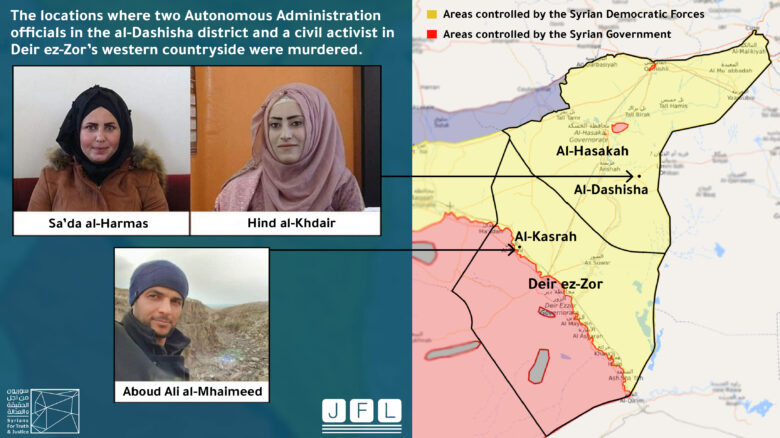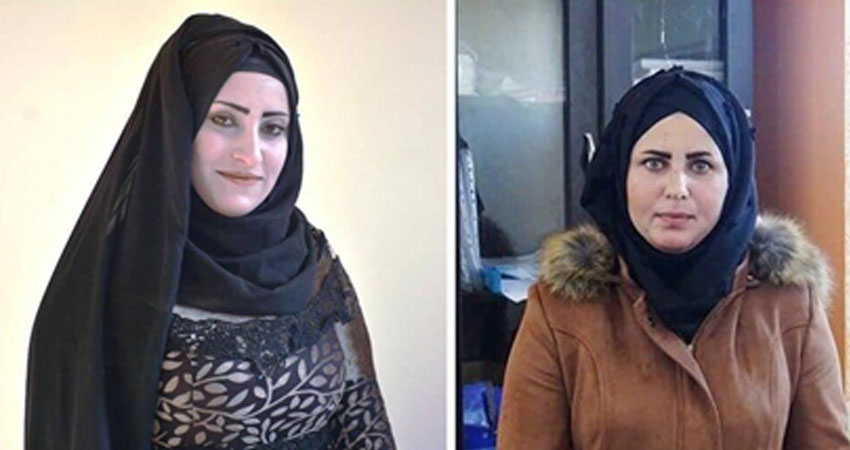Background
The Islamic State (IS), locally known as Daesh, has been ramping up its activities in parts of Deir ez-Zor’s countryside and al-Hasakah’s southern areas, where the Syrian Democratic Forces (SDF) remain in power. In January and February 2021, assassinations perpetrated by IS sleeper cells increased, targeting civilians, including two local female officials of the Autonomous Administration and a local activist.
In this report, Syrians for Truth and Justice (STJ), in cooperation with Justice for Life (JFL), provides the details and circumstances surrounding the murders of the Joint President of the Tal al-Shayer Town Council, Sa’da al-Harmas, and her deputy Hind al-Khdair. The bodies of the two women were retrieved on 22 January 2021, hours after a raid into their homes in Tal al-Shayer town, administratively affiliated to al-Dashisha district, south of al-Hasakah province. Eyewitnesses and relatives of the victims recounted that the two women were led out of their homes by force, kidnapped, shot, and killed by an IS-affiliated group who presented themselves as SDF intelligence personnel.
IS claimed responsibility for the two murders on 24 January 2021, sending shock waves through the ranks of Autonomous Administration workers and the local community. Workers and locals feel threatened and fear for their lives, particularly in the areas of al-Shadadi and al-Dashisha, south of al-Hasakah, and the countryside of Deir ez-Zor. These areas are located near the Syria-Iraq border strip and the Badia (desert) region, which IS fighters continually use to infiltrate surrounding areas and conduct smuggling operations.
On 4 February 2021, the SDF launched a military campaign against IS sleeper cells to avenge the murders of Sa’da and Hind. An SDF officer said that on 13 February the campaign resulted in the capture of one of the two perpetrators.
The rise of violence was not limited to areas south of al-Hasakah province. The Badia region also witnessed the murder of the civil activist Aboud Ali al-Mhaimeed, 33. The victim’s body was found on 23 January. Two gunmen on a motorcycle drove behind al-Mhaimeed’s car and shot at it. One bullet struck the victim, wounding him before he was kidnapped and later found dead.
Eyewitnesses claimed that the gunman stole al-Mhaimeed’s cell phone and, later, a source from the SDF confirmed they used the phone to track one of the murders. The perpetrator confessed to the theft but denied having any link to the murder. The official added that the SDF is still searching for the other gunman who was still at large at the time of reporting, on 22 February 2021.
In addition to the murders of the two female officials, the countryside of al-Hasakah province witnessed several attacks that are widely linked to the IS cells and which target the SDF almost exclusively. In December 2020, a young man, Issa al-Nazal, an Asayish recruit, was kidnapped while on his way home in the al-Shadadi town. Issa’s beheaded body was later found. However, the incident did not make headlines and was never claimed by IS. In other cases over January and February 2021, SDF military vehicles were targeted over five times on the al-Khrafi road.
Unidentified assailants and attackers also continue spreading horror in the countryside of Deir ez-Zor, where rates of violence have been spiking. Assassinations, exchanges of gunfire, and raids carried out by SDF-affiliated security services protract the insecurity and instability of the region. In one incident, a man was shot and killed by a gun with a silencer on 22 November 2020 in Diban village, east of Deir ez-Zor. The perpetrator remains at large. In a second incident, the dead bodies of two former armed opposition groups were discovered on 27 November 2020. In a third incident, the SDF exchanged fire in Zghair town with the locals during a raid in January 2021. The clash resulted in the death of an SDF fighter, originally from the town, and the injury of 11 other locals and SDF fighters.
However, it was a series of tribal sheikhs’ assassinations in Deir ez-Zor’s countryside in 2020 that most affected the local community. The assassinations of tribal leaders led to protests in the streets, with people blocking roads with burning tires. The tribes, for their part, demanded that the Autonomous Administration make large-scale changes to improve its management and infrastructure.

Image 1- Map of the locations where the three victims were murdered—the two female officials of the Autonomous Administration in the al-Dashisha district, south of al-Hasakah, and the civil activist in Deir ez-Zor’s western countryside.
Methodology
To provide a detailed account of the three murders reported above and the violence that struck areas covered in this report, STJ and JFL conducted 11 interviews.
Pertaining to the murders of the two female officials, field researchers of the two organizations spoke to eight eyewitnesses, among them relatives and SDF officials.
The field researchers also probed into the murder of civil activist Aboud Ali al-Mhaimeed. They interviewed three witnesses, among them the victim’s relatives and an SDF official.
The researchers conducted the 11 interviews online between January and late February 2021 and consulted a variety of open sources that covered the violent crimes in the countryside of Deir ez-Zor and the areas south of al-Hasakah.
Read the full report as a PDF by following this link.

